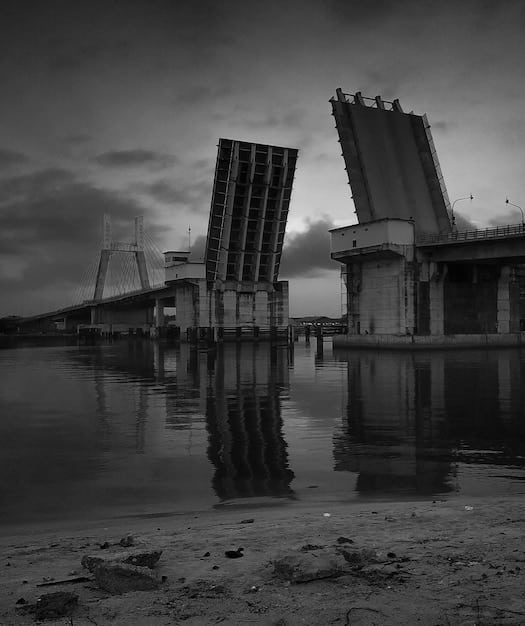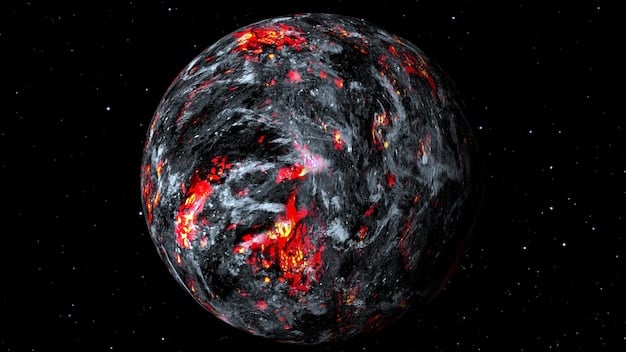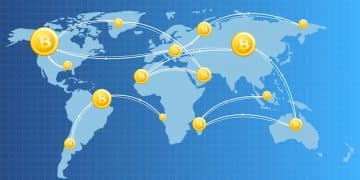Nuclear Arms Race: Understanding the Global Consequences

A nuclear arms race between major world powers could lead to devastating consequences, including widespread destruction, long-term environmental damage, economic collapse, and a breakdown of international relations, potentially resulting in a global humanitarian crisis.
The specter of a **nuclear arms race between major world powers** looms large, casting a shadow of uncertainty and fear over the international landscape. Understanding the potential ramifications of such a scenario is crucial for informed discussions and proactive measures. Let’s delve into the complex web of consequences.
Understanding the Escalation: What Fuels a Nuclear Arms Race?
A nuclear arms race doesn’t erupt spontaneously; it’s a gradual escalation driven by a complex interplay of factors. Understanding these drivers is crucial to grasp the potential for — and the perils of — such a competition escalating between major world powers.
Several motivations can push nations toward building up nuclear arsenals, which include perceived threats to national security, the desire for geopolitical influence, and the maintenance of deterrence against potential aggressors.
The Security Dilemma
Often, a nuclear buildup by one nation triggers a response from others. This phenomenon, known as the security dilemma, involves a situation where actions by a state intended to heighten its security, such as increasing military strength, can lead other states to respond with similar measures, which can increase tensions that creates an arms race.
Prestige and Power Projection
Nuclear weapons are, unfortunately, still seen by some as symbols of prestige and power. Nations might pursue them to elevate their standing on the world stage and project their influence globally. This motivation can supersede practical security concerns and further fuel an arms race.
- Technological Advancements: Innovations in nuclear technology, such as more accurate delivery systems, stealth capabilities, and miniaturized warheads, constantly raise the stakes. Each new development fuels a desire among nations to maintain a technological edge.
- Erosion of Treaties: The weakening or abandonment of arms control treaties removes constraints on nuclear development and deployment. This can lead to a free-for-all scenario where nations feel compelled to expand their arsenals without limitations.
- Domestic Politics: Internal political pressures, such as lobbying from military-industrial complexes or nationalist sentiments, can influence a nation’s nuclear policy. These factors can create a bias toward increasing nuclear capabilities regardless of the broader international context.
Ultimately, a nuclear arms race is a dangerous game fueled by fear, ambition, and a lack of trust. Recognizing the underlying causes is the first step toward mitigating the risk of such a devastating scenario.
The Immediate Devastation: Direct Consequences of Nuclear War
In the grim reality of a nuclear conflict, whether through accidental, mistaken, or intentional means, the instantaneous consequences are nothing short of catastrophic. The destructive power unleashed would have immediate and devastating impacts with no ability to go back.
The immediate aftermath of a nuclear attack would involve a complex series of destructive events, each compounding the others.

Blast, Heat, and Radiation
The initial blast from a nuclear weapon would create a shockwave that obliterates everything within a certain radius. Intense heat would ignite widespread fires, creating firestorms that engulf entire cities. Radiation exposure would cause immediate and long-term health effects, including radiation sickness and increased cancer rates.
Electromagnetic Pulse (EMP)
A high-altitude nuclear detonation can generate an electromagnetic pulse (EMP) that fries electronic devices over a wide area. This would cripple essential infrastructure, including power grids, communication networks, and transportation systems, leading to widespread chaos and disruption.
- Loss of Life: The immediate death toll from a nuclear attack would be staggering, with millions perishing in the initial blasts and fires. Many more would die in the following days and weeks from radiation exposure, injuries, and lack of medical care.
- Infrastructure Collapse: Critical infrastructure, such as hospitals, power plants, and water treatment facilities, would be destroyed or rendered inoperable. This would severely hamper rescue efforts and make it impossible to provide basic services to survivors.
- Environmental Damage: Nuclear explosions would release large amounts of radioactive material into the atmosphere, contaminating soil, water, and air. This would have long-lasting effects on ecosystems and human health.
In short, the immediate devastation of a nuclear war would be unprecedented in human history, bringing with it the extinction of not only millions of lives but turning the world into pure chaos.
The Long Winter: Environmental and Climatic Catastrophe
Beyond the immediate destruction, a nuclear conflict could trigger a cascade of long-term environmental consequences, the most alarming of which is nuclear winter. This climatic catastrophe would have repercussions that would last for years, even decades, after the initial attacks.
The conditions for nuclear winter arise primarily from the massive amounts of smoke and soot injected into the upper atmosphere by the firestorms ignited by nuclear blasts.
Blocking Sunlight
This particulate matter would block out sunlight, leading to a significant drop in global temperatures. Reduced sunlight would disrupt photosynthesis, leading to widespread crop failures and ecological collapse. This catastrophic climate change would extend well beyond the immediate war zones.
Ozone Depletion
Additionally, nuclear explosions would release large amounts of nitrogen oxides into the stratosphere. These compounds would deplete the ozone layer, increasing exposure to harmful ultraviolet radiation from the sun.

- Global Cooling: Scientists predict that a large-scale nuclear war could cause temperatures to plummet to levels not seen in centuries, leading to a “nuclear winter.” This would have devastating consequences for agriculture and ecosystems around the world.
- Food Shortages: Reduced sunlight and disruptions to agriculture would lead to widespread food shortages and famine. The resulting competition for scarce resources could trigger social unrest and conflict.
- Ecological Collapse: Many plant and animal species would be unable to survive the harsh conditions of a nuclear winter, leading to mass extinctions and the disruption of ecosystems. This would have long-lasting consequences for biodiversity and ecosystem services.
In short, the long-term environmental consequences of a nuclear war would be catastrophic, potentially leading to a global ecological catastrophe. The legacy of such a conflict would be felt for generations to come on a planet ravaged by climate change, radiation, and widespread ecological damage.
Economic Ruin: The Shattering of Global Economies
A nuclear arms race, even if it doesn’t culminate in an actual war, can inflict severe damage on global economies. The diversion of resources toward military spending, the erosion of trust, and the disruption of trade can trigger a domino effect, leading to economic instability across the world.
The economic impact of a nuclear arms race would be multifaceted, affecting everything from government spending to international trade.
Resource Diversion
The massive investment in nuclear weapons and related infrastructure would divert resources away from essential sectors such as healthcare, education, and infrastructure development. This reallocation would slow economic growth, reduce living standards, and exacerbate social inequalities.
Trade Disruption
Heightened tensions and geopolitical instability would disrupt international trade and investment flows. Businesses would become hesitant to invest in regions perceived as being at risk of conflict, leading to a decline in economic activity and job losses.
- Market Volatility: Financial markets would become highly volatile as investors react to escalating tensions and the possibility of nuclear war. Stock markets could crash, currencies could plummet, and interest rates could spike.
- Supply Chain Breakdown: A nuclear conflict would severely disrupt global supply chains, leading to shortages of essential goods and services. This would drive up prices, reduce consumer spending, and further depress economic activity.
- Long-Term Recovery Costs: Even after the end of a nuclear conflict, the costs of reconstruction and recovery would be astronomical. It could take decades, if not centuries, to rebuild damaged infrastructure, clean up contaminated areas, and restore economic stability.
In summary, the economic consequences of a nuclear arms race would be far-reaching and devastating, with long-term implications for global prosperity. The diversion of resources, disruption of trade, and long-term costs of recovery would leave the world economy crippled for generations.
Societal Collapse: The Breakdown of Order and Governance
Beyond immediate destruction and economic ruin, one of the most devastating consequences of a nuclear arms race is the potential for societal collapse. The disruption of essential services, the breakdown of law and order, and the erosion of trust in institutions would create a perfect storm for social disintegration.
Even in the absence of actual nuclear war, the societal ramifications of an escalating arms race would be profound.
Erosion of Trust
heightened fear and uncertainty would erode trust in governments and institutions, leading to widespread civil unrest and political instability, a sense of doom would prevail.
Mass Migration
The instinct for survival would trigger mass migrations as people flee from urban centers to rural areas seeking to escape the chaos and potential targets.
- Rise of Authoritarianism: Faced with escalating crises, governments might resort to authoritarian measures to maintain control. This could lead to the suppression of civil liberties, increased surveillance, and the erosion of democratic institutions.
- Resource Wars: Competition for scarce resources, such as food, water, and energy, could trigger local and regional conflicts. These resource wars would further destabilize societies and lead to widespread suffering.
- Mental Health Crisis: The constant threat of nuclear war and the disruption of daily life would take a toll on mental health. Rates of anxiety, depression, and post-traumatic stress disorder would soar, overwhelming already strained mental health services.
In closure, a nuclear arms race would not only threaten our physical survival but also the very fabric of our societies. The breakdown of order, governance, and social cohesion could lead to a world unrecognizable from the one we know today.
Geopolitical Instability: The Tearing Apart of International Relations
A nuclear arms race would not only imperil the physical and economic well-being of nations but would fundamentally undermine international relations. The bonds of cooperation and diplomacy would fray, replaced by suspicion, antagonism, and a heightened risk of miscalculation.
The very architecture of international cooperation would be destabilized by such a competitive build-up.
Erosion of Diplomacy
The focus on military strength and deterrence would overshadow diplomacy. Negotiations and arms control agreements would become more difficult to achieve, leading to breakdowns in trust between great powers.
Proxy Conflicts
Great rivalries backed by great powers, could become more frequent and intense, with each side using these conflicts to test the resolve and capabilities of its adversaries.
- Increased Risk of Miscalculation: In an atmosphere of heightened tension and mistrust, the risk of miscalculation would increase significantly. A misinterpreted signal, a technical malfunction, or a rash decision could trigger a nuclear exchange.
- Nuclear Proliferation: As major powers build up their arsenals, other nations might be tempted to acquire nuclear weapons as well. This could lead to a dangerous proliferation cascade, increasing the risk of nuclear war.
- Weakening of International Law: A nuclear arms race could undermine the authority of international law and institutions. Nations might be more inclined to act unilaterally, disregarding international norms and treaties.
To summarize, a nuclear arms race threatens to dismantle the very foundation of international cooperation. The breakdown of diplomacy, risk of miscalculation, and weakening of international law could plunge the world into a new era of geopolitical instability, making conflict more likely.
Ethical and Moral Dimensions: The Unconscionable Consequences
The conversation about the potential consequences of a nuclear arms race cannot be complete without addressing the ethical and moral dimensions. Beyond the physical destruction, economic ruin, and societal collapse, such a race raises profound questions about our responsibility to humanity and the future of our planet. Because, at the end of the day, is it worth it?
In the context of nuclear weapons, ethical considerations are not abstract musings but rather urgent matters of survival.
Dehumanization
Nuclear warfare is, by its very nature, indiscriminate. It does not distinguish between combatants and civilians, guilty and innocent. An arms race fuels a dangerous process of dehumanization, where the potential victims of nuclear war are reduced to mere targets.
Intergenerational Justice
The legacy of nuclear weapons extends for generations. The environmental contamination, genetic damage, and psychological trauma caused by a nuclear conflict would burden future generations. An arms race ignores our responsibility to ensure a safe and healthy planet for those who come after us.
- Moral Responsibility: Leaders who make decisions about nuclear weapons bear a heavy moral responsibility. They must weigh the potential benefits of these weapons against the catastrophic consequences of their use.
- Ethical Dilemmas: Nuclear deterrence is based on the threat of massive retaliation. This raises ethical dilemmas about whether it is ever morally justifiable to threaten to kill millions of innocent people as a means of preventing attack.
- Humanitarian Concerns: The potential humanitarian consequences of a nuclear war are so vast and devastating that they challenge our fundamental moral principles. No cause can justify the intentional destruction of civilization.
Because, at the end of the day, we need to acknowledge that the ethical and moral dimensions of a nuclear arms race are as catastrophic as the rest of the potential concequences.
| Key Point | Brief Description |
|---|---|
| 💥 Immediate Devastation | Nuclear blasts cause immense destruction and immediate loss of life. |
| ❄️ Nuclear Winter | Smoke blocks sunlight, leading to drastic temperature drops and crop failures. |
| 📉 Economic Collapse | Resources diverted, trade disrupted, leading to long-term economic ruin. |
| 🌍 Geopolitical Instability | International relations erode, increasing the risk of miscalculation and conflicts. |
Frequently Asked Questions
▼
A nuclear arms race is a competition between nations to develop and stockpile nuclear weapons. This is often driven by perceived threats and a desire to maintain a strategic advantage.
▼
Nuclear winter occurs when soot from nuclear explosions blocks sunlight, causing drastic temperature drops. This disrupts agriculture, leading to crop failures and ecological collapse.
▼
The immediate consequences include destructive blasts, intense heat, and radiation. Electromagnetic pulses would also cripple electronic devices, leading to widespread chaos.
▼
Resources are diverted from essential sectors, disrupting trade. Increased geopolitical instability causes market volatility and long-term economic ruin.
▼
A nuclear conflict could lead to the breakdown of civil society, the rise of authoritarianism, mass migrations, and a severe mental health crisis worldwide.
Conclusion
The consequences of a **nuclear arms race between major world powers** are far-reaching and devastating, threatening not only physical survival but also the very fabric of our societies, economies, and international relations. Understanding these multifaceted risks is essential for promoting peace, diplomacy, and a more secure future for all.





